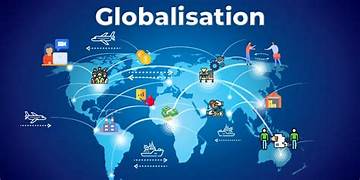The Impact of Globalization on Investment Strategies
Globalization, the process of increased interconnectedness and interdependence of economies, societies, and cultures, has had a profound effect on various aspects of the global economy. One of the most significant areas of impact is the world of investment. Over the past few decades, as barriers to trade, capital flows, and communication have diminished, investors have increasingly sought opportunities beyond their domestic markets. This trend has led to the evolution of more dynamic and complex investment strategies, reshaping how wealth is accumulated, preserved, and managed globally.
This article explores how globalization has influenced investment strategies, focusing on the challenges and opportunities that arise in a highly interconnected world. We will examine the effects on asset allocation, risk management, the rise of global diversification, and the influence of emerging markets on investment decisions. Ultimately, we’ll explore how investors are adapting to a changing global economic landscape and the future of investment strategies in the age of globalization.
The Shift from Domestic to Global Investment
In the past, many investors focused primarily on their home markets, often due to limited access to foreign markets, the complexities of foreign currency exchange, and regulatory constraints. However, with the advent of globalization, these barriers have gradually been broken down. Improvements in technology, the liberalization of trade policies, and the creation of international financial markets have opened up a wealth of investment opportunities beyond national borders.
The most visible effect of globalization on investment strategies is the increased appetite for international diversification. Traditionally, investors relied heavily on domestic markets, and their portfolios often consisted of local stocks, bonds, and real estate. However, globalization has allowed investors to tap into a broader array of global assets, from emerging market equities to international real estate and foreign bonds.
Investors today are more willing to take on international risks in exchange for potential higher returns. The desire for diversification across different geographies, industries, and sectors has become a key aspect of modern investment strategies. This shift is particularly evident in the rise of Exchange-Traded Funds (ETFs) and mutual funds that target global markets, allowing investors to gain exposure to foreign stocks, bonds, and other assets with ease.
Global Diversification: A Double-Edged Sword
One of the primary reasons investors embrace globalization is the potential for enhanced diversification. By spreading their investments across different countries and regions, investors can reduce the impact of country-specific risks such as political instability, natural disasters, or economic downturns. Additionally, diversification allows investors to take advantage of growth opportunities in different parts of the world, such as in emerging markets, where growth rates often exceed those of developed economies.
However, while diversification across global markets can help spread risk, it also introduces new complexities. Investors must navigate the challenges of currency fluctuations, geopolitical risks, and differences in legal, tax, and regulatory frameworks. For example, a U.S. investor in European stocks is exposed to the risk of fluctuations in the Euro-to-U.S. Dollar exchange rate, which can affect the overall return on investment. Similarly, differences in accounting standards, corporate governance practices, and market structures can add another layer of uncertainty when investing internationally.
Moreover, as global markets become more interconnected, the risk of global financial contagion increases. In the event of a financial crisis in one region, the effects can quickly spread to other parts of the world, as seen during the 2008 global financial crisis. This interconnectedness means that, while diversification can reduce risk, it is not a guarantee against significant losses, especially during periods of global economic turmoil.
Emerging Markets: A Key Focus for Global Investors
Another significant impact of globalization on investment strategies is the increased emphasis on emerging markets (EMs). As developing economies have opened up to international trade and investment, they have become a key focus for global investors seeking higher growth opportunities. Emerging markets, such as China, India, Brazil, and other parts of Asia, Africa, and Latin America, often experience faster economic growth rates than developed economies, driven by factors like urbanization, industrialization, and rising middle-class populations.
The potential for high returns in emerging markets has drawn investors looking to capitalize on these growth opportunities. In particular, the demand for stocks, bonds, and real estate in these regions has surged, as institutional and retail investors seek to benefit from the expansion of emerging market economies. The advent of globalization has made it easier for investors to access these markets through international mutual funds, ETFs, and direct investments in emerging market companies.
However, investing in emerging markets is not without its risks. While these economies may offer attractive growth potential, they also come with heightened volatility and uncertainty. Factors such as political instability, currency devaluation, and regulatory changes can have a profound impact on investment returns in these regions. Additionally, emerging markets tend to be more sensitive to global economic shifts, including commodity price fluctuations and changes in international trade policies.
Despite these challenges, the allure of high growth has made emerging markets an integral part of modern investment strategies. Many investors view exposure to EMs as essential for achieving portfolio diversification and long-term growth, but they must balance this with the understanding that such investments carry a higher degree of risk.
Technology and the Democratization of Investment
Globalization has also been accelerated by the rapid advancements in technology, which have transformed the way investors access information and trade. The rise of online trading platforms, robo-advisors, and mobile investment apps has made it easier for individual investors to participate in global markets. Today, anyone with an internet connection can access real-time financial data, execute trades, and invest in global assets from the comfort of their homes.
This democratization of investment has opened up global markets to a much broader audience. In the past, only wealthy individuals and institutional investors had the resources and expertise to invest in foreign markets. Now, with the advent of low-cost trading platforms and fractional investing, retail investors have the opportunity to diversify their portfolios globally without the need for large capital outlays.
Additionally, the increased availability of financial data and market research has empowered investors to make more informed decisions. Access to real-time economic reports, corporate earnings announcements, and geopolitical news has enabled investors to assess global market conditions more effectively and adjust their strategies accordingly.
Risks in the Age of Globalization
While globalization has undoubtedly created new opportunities for investment, it has also introduced a host of risks that investors must consider. One of the key challenges is the increased complexity of managing portfolios across multiple markets and regions. Investors must be well-versed in the economic conditions, legal frameworks, and regulatory environments of the countries in which they invest. Additionally, they need to understand the impact of currency fluctuations, as exchange rate movements can have a significant effect on the returns of international investments.
Another major risk is geopolitical instability. As global supply chains become more interconnected, political tensions, trade wars, and conflicts can have widespread effects on markets. The ongoing trade dispute between the U.S. and China, as well as the geopolitical uncertainty surrounding Brexit, serve as reminders of the vulnerability of global markets to political and economic disruptions.
Furthermore, as the world becomes more interconnected, the risk of global economic downturns and financial crises grows. The 2008 global financial crisis demonstrated how a crisis in one region can quickly spread to others, with severe consequences for investors worldwide. Similarly, the COVID-19 pandemic highlighted the vulnerability of the global economy to unforeseen events, with market volatility reaching unprecedented levels.
The Future of Investment Strategies in a Globalized World
Looking ahead, the future of investment strategies will likely be shaped by continued globalization, technological innovation, and changing economic dynamics. Investors will need to adapt to an increasingly interconnected world by embracing new technologies, staying informed about global market conditions, and diversifying their portfolios across different asset classes and regions.
The rise of artificial intelligence and machine learning in investment management is likely to have a profound impact on how investors analyze data and make decisions. These technologies can help investors identify new opportunities, predict market trends, and optimize asset allocations in real-time.
At the same time, the importance of sustainability and environmental, social, and governance (ESG) factors in investment decisions is expected to grow. As global awareness of climate change and social issues increases, investors are placing more emphasis on companies that prioritize sustainability and ethical practices. This shift is likely to influence how investment strategies are developed in the coming years.
Conclusion
Globalization has fundamentally transformed investment strategies, creating both new opportunities and risks for investors. The ability to access international markets, diversify portfolios across regions, and invest in emerging markets has reshaped the investment landscape. However, the complexities of managing global investments, navigating geopolitical risks, and understanding local economic conditions present significant challenges.
As globalization continues to evolve, investors must remain agile and well-informed, adapting their strategies to meet the demands of a rapidly changing world. By embracing technology, staying ahead of global trends, and maintaining a diversified approach, investors can position themselves for success in an interconnected global economy.


